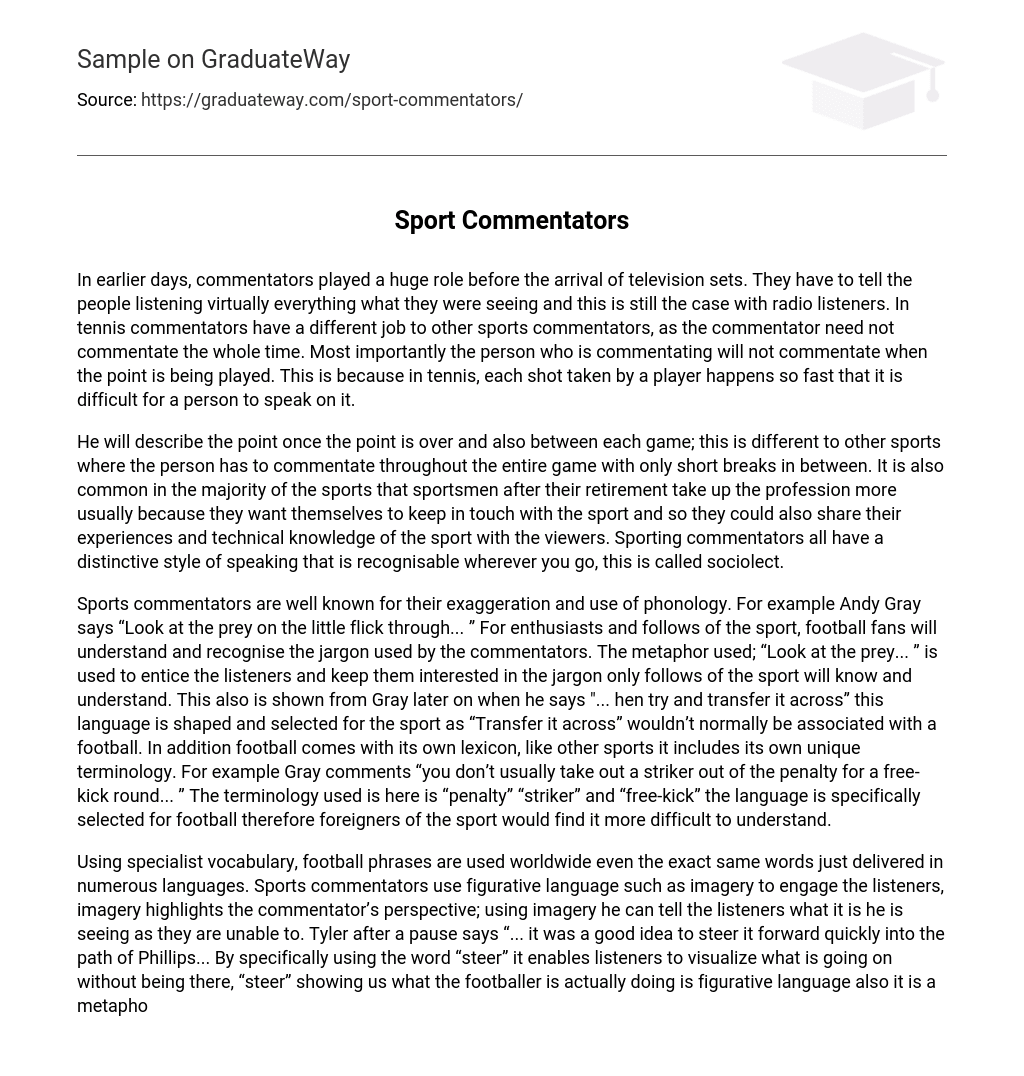In the past, commentators were crucial before television became popular. They had to describe everything they were seeing to the people listening, which is still true for radio listeners. Tennis commentators have a distinct role compared to other sports commentators, as they do not need to commentate constantly. The most significant aspect is that they do not commentate while the point is being played. This is because shots in tennis happen quickly, making it challenging for a person to speak about them.
During tennis games, the commentator will provide analysis once the point is finished, as well as during breaks between each game. This differs from other sports where commentators have to provide continuous commentary throughout the entire game with only short breaks in between. In the majority of sports, it is common for retired sportsmen to become commentators in order to stay connected to the sport and share their experiences and technical knowledge with viewers. Sporting commentators have their own unique style of speaking, known as sociolect.
Sports commentators are known for their exaggeration and use of phonology, as illustrated by Andy Gray’s statement: “Look at the prey on the little flick through…” Football fans, who are enthusiasts and followers of the sport, understand and recognize the jargon used by these commentators. The metaphor, “Look at the prey…” is employed to captivate listeners and maintain their interest in the specialized terminology that only fans of the sport would comprehend. Gray further exemplifies this by saying “… then try and transfer it across;” this language is specifically tailored for football as “Transfer it across” would not typically be associated with the sport. Additionally, football has its own lexicon, just like other sports, which includes its unique terminology. For instance, Gray remarks, “you don’t usually take out a striker out of the penalty for a free-kick round…” The terminology used here includes “penalty,” “striker,” and “free-kick,” which are specially selected for football; therefore, those unfamiliar with the sport may find it more challenging to grasp.
Using specialist vocabulary, football phrases are utilized globally even when spoken in different languages. Sports commentators captivate their audience by employing figurative language, particularly imagery. This use of imagery enables commentators to effectively communicate what they are observing to the listeners. For instance, Tyler articulates, after a momentary pause, “… it was a clever decision to swiftly direct it into the path of Phillips…” The term “direct” assists the audience in visualizing the movement occurring on the football field. Ordinarily, “direct” is not employed to depict the motion of a football; however, within this context, it functions as both figurative language and a metaphor. Hesitations such as “umms,” “errs,” and pauses represent the most common speech production errors which can be encountered in any conversation or spoken discourse.
It is common for individuals to utilize filler words when they are uncertain about what to say, as these words prove helpful in situations where one struggles to find the appropriate words. Similarly to other public speakers, sports commentators face higher levels of pressure compared to regular individuals engaged in a casual conversation. Nonetheless, unlike most public speakers, sports commentators cannot fully prepare their remarks beforehand due to their lack of knowledge regarding the subject matter they will be commenting on. This pressure becomes even more intense in fast-paced sports such as rugby, which involve numerous players and are frequently observed from a distance. For instance, it is noticeable that rugby commentators frequently hesitate, particularly when attempting to identify specific players. These hesitations often manifest as brief pauses within the commentary but do not include any audible sounds. While there has been an increased effort towards fostering inclusivity within sports commentary across various sports disciplines, women have yet to make significant strides into the field of commentating; thus making it uncommon to witness female commentators in action. This situation is peculiar considering that women have been actively involved in sports production for nearly 35 years.
Julie Welch wrote her initial match report for The Observer in 1973, and women have consistently appeared on sports news pages since then. While there are no issues with figures like Helen Chamberlain, Claire Tomlinson, and Gabby Logan serving as hosts on football programs, the entrance of sports reporter Jacqui Oatley into the male-dominated commentary box as the first female commentator on the BBC’s Match of the Day has elicited vehement protests from football fans.





